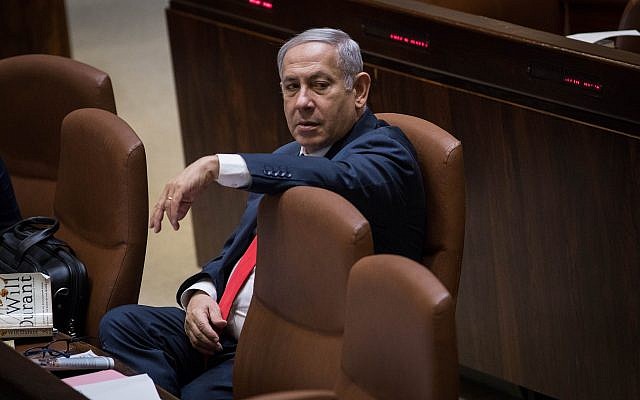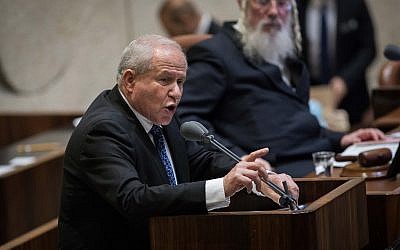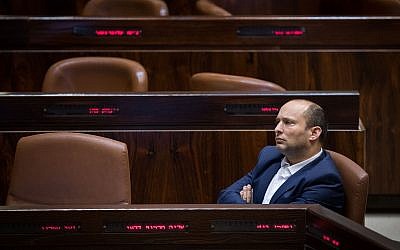Opposition lawmakers blast contentious legislation passed overnight, say it is designed to divide Israeli society

Reactions to the Knesset’s passage overnight Wednesday of the new Jewish State law were predictably divided along party lines, with Prime Minister Benjamin Netanyahu hailing it as “a pivotal moment in the annals of Zionism and the State of Israel.”
Lawmakers approved the law, which enshrines Israel as “the national home of the Jewish people” in the country’s quasi-constitutional Basic Laws, in its second and third readings, with 62 voting in favor, 55 opposed and two abstaining, after hours of heated debate in the Knesset chamber.
While the coalition feted the passage of the law, members of the opposition decried it as nationalistic, divisive and a threat to democracy.

“We enshrined in law the basic principle of our existence,” said Netanyahu. “Israel is the nation state of the Jewish people, which respects the individual rights of all its citizens. This is our state — the Jewish state. In recent years there have been some who have attempted to put this in doubt, to undercut the core of our being. Today we made it law: This is our nation, language and flag.”
The law’s main proponent over the past few years, former Shin Bet head Avi Dichter, said it was a response to anyone in Israel who believes Jewish presence is temporary — referencing Arab MK Jamal Zahalka’s past claim that Arabs will outlast Jews in the country.
“All you can be is an equal minority, not an equal nationality,” Dichter said.
Dichter asserted, “Contrary to the disinformation and fake news that have flooded [the conversation], the Basic Law does not hurt Israel’s minority cultures.” He also claimed it does not detract from the status of the Arabic language.
One clause in the law downgrades Arabic from an official language to one of “special” standing, though it also says that “this clause does not harm the status given to the Arabic language before this law came into effect.”
Read the full text of the law here.
Knesset Speaker Yuli Edelstein was also celebratory, saying “history” had been made in the plenum, and calling the new legislation “one of the most important laws ever to be passed by the Knesset.”
Tourism Minister Yariv Levin condemned the opposition to the law by the Zionist Union faction, and particularly the Labor party, its chief component. “Tell us honestly, Labor members: Do you contest the Jewish people’s right to the Land of Israel? Is it not our nation state? Is its flag not acceptable to you? There has never been such a rejection by the Labor movement of Zionist values.”
Critics have said that the law is discriminatory to Israel’s Arab and other minority populations. and needlessly provokes those minorities by underlining a preferential attitude toward Judaism.
Zionist Union’s Shelly Yachimovich said, “Nobody believes it is nationality and the State of Israel that [the coalition is] interested in,” adding that the law encourages a “debased” form of nationalism “that hates the Other.”

MK Tzipi Livni said the law in its current form prioritizes politics over substance. “When I asked coalition MKs why they weren’t bringing forth a version of the law that a hundred MKs could unite around, they smiled at me cynically and said Netanyahu wants the law to create strife. ‘Otherwise how will people know he’s more patriotic than you? What will we get out of supporting it?’ That’s the method.”
Outgoing opposition chief Isaac Herzog, the new head of the Jewish Agency, was more ambivalent, but expressed concern.
“The question is whether the law will hurt or strengthen Israel,” he said. “History will be the judge. I very much hope the delicate balance between [Israel’s] Jewish and democratic aspects will not be upset.”
In the opposition Yesh Atid party, MK Elazar Stern said the law was an insult “to our Druze and Bedouin brothers who serve with us in the IDF and in the security services.”
A lone voice of dissent in Likud, MK Benny Begin said the legislation was not what he expected from his party, and warned that it could increase societal tensions and boost extreme nationalism.
Meretz party head Tamar Zandberg, too, lamented the “shameful night” and “debased and tainted law.”
The most withering criticism came from the Joint (Arab) List, which called the law “anti-democratic, colonialist, racist and with clear characteristics of apartheid.”
“The law has no mention of the word democracy or the word equality, and is wholly committed to brutish emphasis of ethnic supremacy, leaving no doubt that there are two types of citizenship — first-rate ones for Jews and second-rate ones for Arabs,” it said.
Joint List head Ayman Odeh said in a statement that Israel “has passed a law of Jewish supremacy and told us that [minorities] will always be second-class citizens… Netanyahu’s regime is digging a deep pit of fear, racism, and authoritarianism to divide us from each other. ”
He added, “We will not allow the majority to humiliate and destroy us,” and vowed to fight for “a future for all of us with democracy, equality, and justice.”
The law also declares that Jerusalem is the capital of Israel, sets the Hebrew calendar as the official calendar of the state, and recognizes Independence Day, days of remembrance and Jewish holidays.

On Sunday, Netanyahu and Education Minister Naftali Bennett reached an agreement to cut a controversial clause that would have allowed the state to “authorize a community composed of people having the same faith and nationality to maintain the exclusive character of that community,” and replace it with a new clause celebrating “Jewish settlement” in Israel in general terms.
Lawmakers amended the bill accordingly just hours before the final authorization, removing the clause sanctioning housing discrimination on the basis of ethnicity or religion.
Some of the last-minute changes to the bill came after politicians, legal advisers and others warned that several of its clauses were discriminatory and could cast a dark shadow over Israel in the international arena.
Judaism is already mentioned throughout the country’s laws, and religious authorities control many aspects of life, including marriage. But the 11 existing Basic Laws deal mostly with state institutions like the Knesset, the courts, and the presidency, while Basic Law: Human Dignity and Liberty defines Israel’s democratic character.
As reported by The Times of Israel
